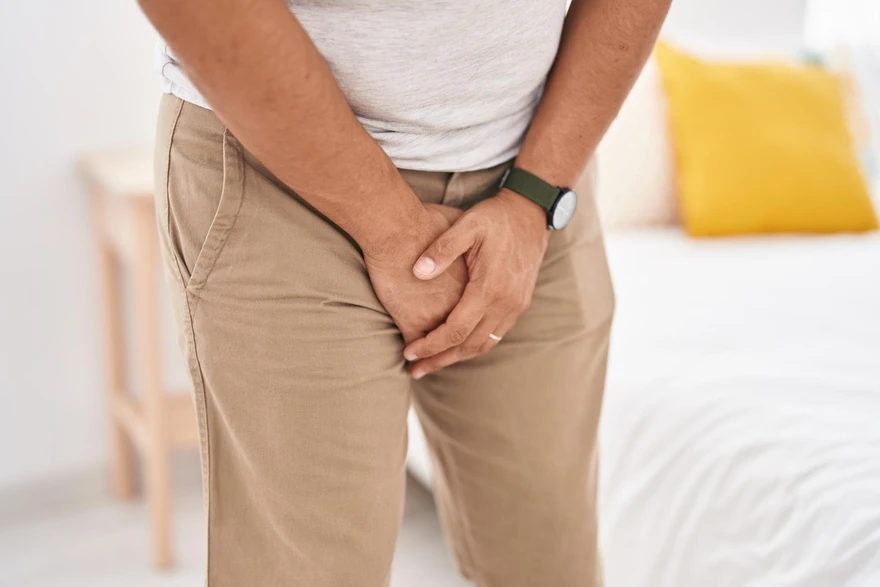Preventive Healthcare
Epididymitis: Causes, Symptoms, and Treatment Approaches
1098 Views
0

What is epididymitis?
Epididymitis refers to the inflammation of the epididymis, a coiled tube located at the back of each testicle responsible for storing and transporting sperm. This inflammation can lead to intense discomfort or pain in the testicular region. As daunting as this may sound, there's no need for panic. Let's understand this condition better so we can be well-equipped to manage it effectively.
What’s the difference between epididymitis and orchitis?
While both conditions involve swelling in the male reproductive system and share similar symptoms like testicular pain and swelling, there's a key distinction between them.
Epididymitis refers specifically to inflammation of the epididymis (the tube at the back of the testicle), while orchitis pertains to inflammation of one or both testicles themselves. Occasionally, these two conditions occur together, resulting in a combined condition known as "epididymo-orchitis".
Who does epididymitis affect?
Epididymitis doesn't discriminate by age. It can affect males at any stage of life but is commonly observed in individuals between the ages of 14 and 35. According to the data, there are an estimated 600,000 cases of epididymitis reported annually in the United States alone.
What are the symptoms of epididymitis?
Epididymitis symptoms might range from mild to severe, depending on the degree of inflammation. Common epididymitis symptoms include:
- Persistent pain in the scrotum that may extend to the entire groin area
- Swelling and redness in one or both testicles
- The presence of blood in semen
- Fever and chills
- Painful urination, also known as dysuria
What causes epididymitis?
Understanding epididymitis causes is crucial for effective prevention and management. In most cases, the condition occurs due to an infection by bacteria such as E. coli, Mycoplasma, or Chlamydia, which can be sexually transmitted. However, epididymitis can also occur from other infections like mumps or, rarely, tuberculosis.
Other potential causes include:
- Urinary reflux into the epididymis due to heavy lifting
- Blockage in the urethra
- Enlarged or infected prostate gland
- Use of a catheter
- Surgery on the prostate, urethra, or bladder
- Traumatic groin injury
It's crucial to note that you can get epididymitis without having an STD, as non-sexually transmitted infections like urinary tract infections can spread to your epididymis.
Can you get epididymitis without having an STD?
Yes, epididymitis can be contracted through non-sexually transmitted infections. Infections in the prostate or urinary tract can spread to the epididymis leading to this condition.
Is epididymitis contagious?
While epididymitis itself isn't classified as a sexually transmitted disease (STD), it can spread through sexual contact if caused by bacteria associated with STDs like Chlamydia or Gonorrhoea.
How is epididymitis diagnosed?
When it comes to epididymitis diagnosis, a healthcare provider will perform a physical examination of your scrotum to identify any tender spots or lumps. They may also order a urine test to check for bacteria, and in some cases, an ultrasound may be used for diagnostic imaging.
How is epididymitis treated?
In most instances, epididymitis treatment involves a course of antibiotics lasting one to two weeks. Commonly prescribed medications include doxycycline, ciprofloxacin, levofloxacin, or trimethoprim-sulfamethoxazole.
Along with antibiotics, measures like rest, applying ice packs to the affected area, drinking ample fluids, elevating the scrotum, and taking non-steroidal anti-inflammatory drugs can help relieve epididymitis symptoms.
What are the complications of epididymitis?
If left untreated, epididymitis can lead to complications such as an abscess in the scrotum or skin ruptures due to swelling and infection. In rare cases, it can also cause fertility issues by damaging the epididymis.
Will epididymitis go away?
With the correct epididymitis treatment approach, epididymitis will gradually subside. However, prompt medical intervention is essential to avoid complications and ensure a speedy recovery.
What can happen if epididymitis is left untreated?
Unattended epididymitis could escalate into chronic epididymitis, which may lead to abscess formation on the scrotum or even infertility. In more severe cases, the infection could spread throughout the body. Therefore, timely medical intervention is crucial.
How can I reduce my risk for epididymitis?
Prevention is better than cure! Here are some practical ways you can reduce your risk of epididymitis:
- Use condoms during sexual activities.
- Avoid strenuous lifting or heavy physical activity.
- Limit long periods of sitting that may put pressure on the scrotum.
What can I expect if I have epididymitis?
If you've been diagnosed with this condition, don't fret. With the right antibiotics and home care measures, your symptoms will soon be alleviated. Continued discomfort and swelling may persist for weeks or even months after completing antibiotic treatment, but they will gradually subside.
How long can epididymitis last?
The discomfort caused by epididymitis normally begins to subside after three days of treatment. However, a full recovery might take weeks or even months.
When should I see a doctor?
If you spot any epididymitis symptoms, such as testicular pain or swelling, it's crucial to reach out to a healthcare provider immediately. In cases of sudden or severe testicular pain, immediately seek emergency medical help.
Conclusion
Epididymitis, though potentially painful and distressing, can be effectively managed with timely diagnosis and treatment. Prioritising your health is of utmost importance in managing this condition.
If you suspect any symptoms related to this condition, don't hesitate to reach out to Metropolis Healthcare – a leading chain of diagnostic labs across India, known for their accurate pathology testing and health check-up services.













1701259759.webp)









 WhatsApp
WhatsApp